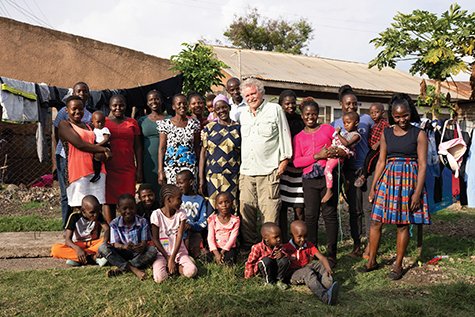ISLANDERS

Crisis in Kenya
How Islanders are Making a Difference in Africa
By Tessa Permar, Photographs by Luke Catena
When Len Morris, founder of Media Voices for Children (MVC), a Vineyard based non-profit, arrived in Kenya last November, he was eager to visit the school kids MVC has supported through the Kenyan Schoolhouse Program. For more than three decades MVC has used film, photography, writing, and advocacy to expose the worst of child labor in the United States and the world, and to provide young people with safety, education, and hope for the future.
What Len encountered on this post-covid trip to Kenya shocked him. “What I wasn’t prepared for was the amount of poverty, the amount of hunger, the number of children forced into gravel quarries and dump sites,” Morris expressed. As he traveled to gold mines, sugarcane fields, brickyards, and landfills, he encountered children of all ages, forced to leave school due to lack of funds, now laboring in exploitative and often deadly conditions. Traveling with two social workers, a bare-bones film crew, and guides, the team interviewed school children up to their elbows in silt, clay, feathers, or trash, or deep in the ground amidst flimsy scaffolding. Looking into the camera the children spoke to the translator. Even while performing different kinds of hard labor, all the children described similar circumstances: they had stopped going to school and started working in order to help their families pay for necessities, usually food, which tripled in price during the pandemic. They are paid the equivalent of 30 cents a day. If it rains and they cannot work or their products are damaged, they receive no pay. Young children work alongside adults, which increases the risk of exploitation and abuse. The footage and firsthand reporting from MVC depict a dire situation.
In 2021, Kenya declared a national disaster due to drought that continues today. Millions of livestock and crops have perished. This, coupled with the pandemic has left an estimated 4.4 million people facing food insecurity (as reported by the Kenyan government). UNESCO estimated 3.5 million children would not be able to return to schools due to lack of funds for food and fees. The numbers are difficult to fathom. It can be challenging to see beyond these massive numbers to the individuals impacted and the opportunities for change. But that is exactly what Media Voices for Children does so well. Presenting first person stories on screen, they bring commonality and compassion to the forefront of the crisis.
At each site they visited in rural Kenya, Morris and his crew asked all the young laborers they encountered if they would like to attend school or a vocational program. Every one of them said yes. The social workers signed the students up and MVC began the logistically and financially daunting task of getting these kids back to school. “I didn’t make any distinctions,” Len Morris explains, “I had two social workers, and I just said, sign them up…it's the only way to protect them from exploitation, especially the young women who - desperate to help their families - are prime targets for trafficking.” These students will receive the support they need to attend school from MVC’s Kenyan Schoolhouse program. This program partners with the African Network for the Prevention and Protection Against Child Abuse and Neglect to help students escape exploitative environments, locate and enroll in a school, find and pay for transportation, as well as afford food and tuition. In addition to student fees, MVC also provides direct food aid to their families, freeing the children from having to contribute to their families’ income and survival.
Unlike many government aid groups and large-scale aid organizations where donations and promised help can take a long time to reach their destinations, Media Voices for Children is a company made up of a few extremely passionate individuals. While in Kenya, Morris signed up 793 children for school, effectively releasing them from work at dan-gerous job sites. Upon his return, MVC received news that one of the mines they visited had collapsed trapping fifteen miners. None of the trapped workers were children, because they had been signed up for school. Morris explains, ”Life and death is the core criteria for children's human rights.” In order to cover the fees to support 793 school kids, MVC committed 70% of their entire 2023 operating budget. They need urgent help to fully cover school fees and provide aid to the families. They are crowdfunding on Chuffed.org under Kenyan Schoolhouse to support the 793 now enrolled in school.
Media Voices for Children is a local non-profit with a mighty global impact. Original team members Len and Georgia Morris, Petra Lent, and Chris Mara meet in a studio that’s part literary retreat, part hi-tech headquarters to process film, transcribe interviews, write, edit, debate, and hone raw and often brutal footage into poignant portraits of humanity. Together they have created and produced five full-length films and a multitude of other media designed to educate, advocate, and provide direct aid to those in need.
Their most recent feature, “Butterfly Butterfly” presents a snapshot of child labor around the world today. It screens at the Martha’s Vineyard Film Festival in March as part of a program on children’s human rights, which also includes interviews with director Len Morris, producer Petra Lent McCarron, food activist and writer Ali Berlow, and film subject José Velázquez Castellanos. Screened alongside this presentation on international children’s rights is a short film focusing on child labor in the United States. “The Pink Bucket” was created in partnership with three first generation college students and Child Labor Coalition interns who have firsthand experience working in agriculture in the US as children. Their stories of incredible physical strain and resilience accompany footage of multigenerational family laborers working in tobacco and berry fields. Dehydration, physical exhaustion, and exposure to pesticides, direct sun, and tobacco poison makes working in agriculture in the United States as dangerous as anywhere in the world. A New York Times article recently exposed the prevalence of illegal child labor in many factories and corpora-tions stateside. “The Pink Bucket” shines a revealing light on agricultural work and the former child laborers now fighting for change.
Members of MVC have created films with their local production company Galen Films, featuring organizations like Island Grown Initiative and the Martha’s Vineyard Hospital. In addition to filmmaking, MVC runs an education platform called Learnchildrights.org. Here they present a bounty of material including online and print magazines as well as a curriculum called Childhood Unbound. But their primary focus right now is processing the footage and the difficult realities Len Morris encountered in his most recent trip to Kenya.
By the time you read this, Morris will have recently returned from Washington, DC. He used recent footage from Kenya to try to persuade the United States Agency for International Development, the Department of Labor, the Child Labor Coalition, and others to fund education for children in Kenya. Despite the scale of these organizations, bureaucratic processes can slow and even curtail the aid, while the need in Kenya is urgent. Donations to MVC’s Kenyan Schoolhouse campaign go directly to supporting the students and their families. To support, go to Chuffed.org and search: Kenyan Schoolhouse. To learn more about child labor visit MVC’s LearnChildRights.org. To support their work at Kenyan Schoolhouse and educate former child laborers, please go to their campaign on Chuffed.org.
You may also send a check to Media Voices for Children, 110 Daggett Avenue, Vineyard Haven, MA 02568, 508-693-0752
More information on their work can be found at MediaVoicesforChildren.org. Media Voices for Children is a registered 501(c)3 educational charity. 100% of your donation is tax-deductible.








